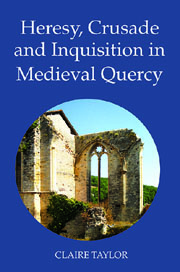Book contents
- Frontmatter
- Contents
- List of illustrations
- Dedication
- Acknowledgements
- Prefatory Note on Words
- List of Abbreviations
- Map 1 Medieval Quercy
- Map 2 Gourdon and its sphere
- The house of Gourdon
- Introduction
- 1 Investigating medieval Quercy: questions about sources
- 2 Medieval Quercy
- 3 War and its aftermath
- 4 ‘Heretical’ Quercy: the evidence gathered by c.1245
- 5 Heresy: a social and cultural life
- 6 Heresy and what it meant
- 7 The reshaping of Quercy
- Conclusion
- Bibliography
- Index
- YORK MEDIEVAL PRESS: PUBLICATIONS
4 - ‘Heretical’ Quercy: the evidence gathered by c.1245
Published online by Cambridge University Press: 05 February 2013
- Frontmatter
- Contents
- List of illustrations
- Dedication
- Acknowledgements
- Prefatory Note on Words
- List of Abbreviations
- Map 1 Medieval Quercy
- Map 2 Gourdon and its sphere
- The house of Gourdon
- Introduction
- 1 Investigating medieval Quercy: questions about sources
- 2 Medieval Quercy
- 3 War and its aftermath
- 4 ‘Heretical’ Quercy: the evidence gathered by c.1245
- 5 Heresy: a social and cultural life
- 6 Heresy and what it meant
- 7 The reshaping of Quercy
- Conclusion
- Bibliography
- Index
- YORK MEDIEVAL PRESS: PUBLICATIONS
Summary
In this chapter the depositional evidence as it relates to significant individuals and families is outlined. In reading this kind of evidence alongside evidence for monastic, town, military and other secular and regular activity such as that addressed in Chapters 2 and 3, we see certain individuals and families emerge as more significant than others in both socio-political and ‘heretical’ circles. This helps us further in reconstructing those networks of political and confessional affinity that shaped Quercy between c.1209 and the mid-1240s, an aspect of quercinois life that will analysed in Chapter 6. A wealth of more incidental data emerges also from the depositions relating to what we could call the ‘social life of heresy’, and also evidence that helps us to explore competing belief systems and interactions between them. The data the depositions and sentences reveal is detailed and prosopographical in nature. They have never received the treatment they deserve in this sense, except in some cases in the work of Edmunde Albe. This approach will be built on in Chapters 5–7 and the evidence related both to what we have learned about Quercy in previous chapters and to further evidence for the social and political life of Quercy.
Guillaume Arnaud and Pierre Seilan's First Inquests
Cahors (1233), Moissac (1234) and Montauban (1236)
We have no direct evidence of prosecutions until those enacted by Guilluame Arnaud in the mid-1230s and there we do not have registers and records as we do for the work of Pierre Seilan and Bernard de Caux.
- Type
- Chapter
- Information
- Heresy, Crusade and Inquisition in Medieval Quercy , pp. 122 - 153Publisher: Boydell & BrewerPrint publication year: 2011



